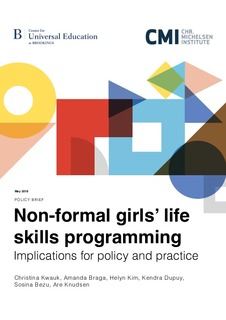Non-formal girls’ life skills programming Implications for policy and practice
Research report
Permanent lenke
http://hdl.handle.net/11250/2503067Utgivelsesdato
2018-05-01Metadata
Vis full innførselSamlinger
- Publications [1488]
Originalversjon
NW Washington, DC: The Brookings Institution (POLICY BRIEF) 12 p.Sammendrag
Research in developing countries demonstrates the importance of life skills for improving a range of outcomes for adolescent girls. These outcomes include improved psychosocial and mental health (e.g., emotional resilience, reduced post-traumatic stress, increased sense of self-efficacy), sexual and reproductive health; social relationships (including reduced domestic or intimate partner violence); social networks; and economic assets and opportunities (e.g., access to resources like loans, increased savings levels, earnings, etc.). Studies also suggest that life skills development is important for increasing girls’ sense of control over their lives, as well as their self-confidence and agency. In addition to improving girls’ lives, targeting life skills trainings in combination with the teaching of other skills may lead to overall better societal outcomes. Emerging evidence suggests that teaching a breadth of skills—including academic, vocational, and socioemotional skills—rather than focusing on a narrow set of skills is key for sustaining successful life outcomes. Indeed, studies suggest that non-academic skills may be a better predictor of individual economic success in the labor market than academic skills alone. And, life skills programs that include a focus on issues of gender (e.g., gender rights, gender norms, etc.) and power (e.g., power in relationships) may be more effective at reducing risky health behaviors, reducing rates of early marriage, and increasing pro-gender equality attitudes than programs that do not include such content.
